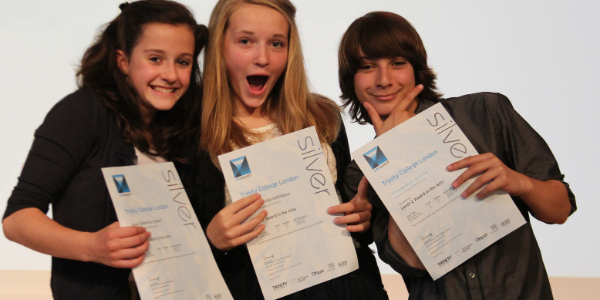
How to run Arts Award as an extra-curricular activity (Part 2)
BY: Guest Writer
26 Jun 2017
Following on from Part 1 of this guide, Claire Everett, Arts Award adviser and teacher at Cranborne Middle School, shares her practical guide on running Arts Award as an extra-curricular activity.
4.How to fund Arts Award
This depends on several factors: your school’s financial situation and budgets; the type of projects and links with Arts Award Supporter venues; and the socio-economic status of your cohort.
My students’ parents and carers pay the full amount, or in three instalments, before the commencement of the Awards at the end of September. If we attend a trip, they pay for this separately. All students undertake their own individual projects and pay for most of their own materials. For some students, if they are in receipt of Free School Meals the school covers the cost from the Pupil Premium fund to ensure no-one is excluded from taking part. The cost to parents covers the cost of entering young people for their award, materials, Arts Award lapel badges, lanyards and pens (which I give as gifts in the end of year annual Arts Award Celebration Evening).
Ideas for funding:
- Full parental funding. Ask for the full amount or instalments throughout the duration of the programme. Your school may or may not decide to pay for Pupil Premium students.
- Some Arts Award Supporters offer funding for young people who undertake the whole or part of their Arts Award linked to them.
- If you want to deliver Arts Award but are working with young people who may struggle to access it, you may be able to apply for an Arts Award Access Fund grant. Visit artsaward.org.uk/Accessfund for more information
To help you write your overview for the number of sessions you intend to run, use the planning template on the Arts Award website.
- Think to yourself-what do I want them to know/ learn/understand/work on in each session?
- Call a register at the beginning of each session and expect punctuality.
- Be brief in your delivery at the start of each session.
- Leave a task list on the board for students to refer to. Give choice but also structure to the sessions.
- Circulate, as you would in class but don’t spend too long with any one student.
- Toward the end of each part, sit down and ask students to come to you 1:1 to review their portfolios. Give them to-do lists to work through, such as evidence checklists downloadable from the Resource Library.
- Listen to them, get excited about their projects and ideas, offer advice but try not to take over. Encourage students to help each other.
- After the structured sessions are over, open up your room to more informal 1:1 sessions, so that students can drop in to show you their work.
- When approaching the deadline before moderation, target individual students and insist they work closely with you on a regular basis, so you can support them in their organisation and collection of their evidence and the bringing together of their portfolios.
6.How long the programme can be expected to last for:
Here is my offer and a brief overview of the order of my delivery. Please note: Bronze and Silver participants are also invited to drop in on me at lunchtime to discuss their portfolios and ask any questions.

Common challenges and how these are overcome:
- Student retention – encourage students to sign up to a statement of commitment at the start of their Arts Award journey. You will lose some students, but perhaps think about re-engaging them the following year. Getting students to pay upfront is a good way to increase parental engagement and get support from home.
- Competition between students – it is natural that some students may get competitive with their Arts Award. It may be in how they present their portfolios or the work or projects they get involved in. Keep reminding students that they are not competing with each other, and it is their individual progress and development that moderators will want to see. A strength of Arts Award is that it celebrates the individual students' achievements, unrelated to school expectations or what other people are doing.
- Assessment and moderation preparation – this can take time, especially if you have a large group and you are the only adviser. Review portfolios as you go and assess throughout the year rather than leaving it to the last minute. See if there another adviser who can support you to assess work, or see if the admin or finance office can help with submitting students.
- Juggling it all! – unfortunately there is no magic answer to this. Having support from colleagues, a good plan for the year and clear deadlines in mind will help, but naturally things will crop up which you haven’t planned for. Try not to panic, and remember that there is lots of support available from Arts Award if you need it!
Related posts
BY: Guest Writer
BY: Nicola King




Comments & Replies